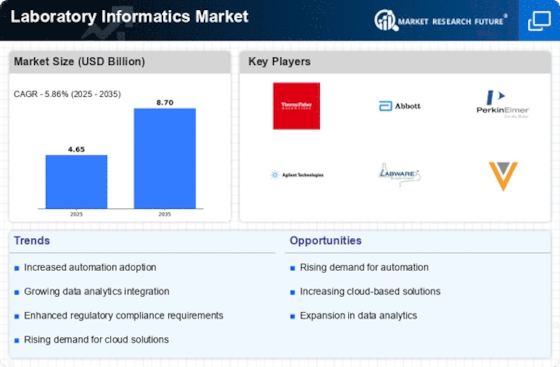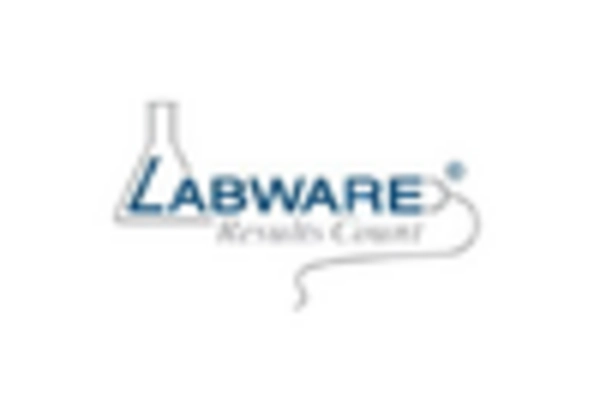LIMS
ELN
SDMS
CDS
Analytics Software
On-Premise
Cloud-Based
Hybrid
Pharmaceuticals
Biotechnology
Clinical Laboratories
Academic Research
Environmental Testing
Drug Discovery
Quality Control
Clinical Research
Environmental Testing
Food Beverage Testing
North America
Europe
South America
Asia Pacific
Middle East and Africa
North America Outlook (USD Billion, 2019-2035)
North America Laboratory Informatics Market by Type
LIMS
ELN
SDMS
CDS
Analytics Software
North America Laboratory Informatics Market by Deployment Type
On-Premise
Cloud-Based
Hybrid
North America Laboratory Informatics Market by End User Type
Pharmaceuticals
Biotechnology
Clinical Laboratories
Academic Research
Environmental Testing
North America Laboratory Informatics Market by Application Type
Drug Discovery
Quality Control
Clinical Research
Environmental Testing
Food Beverage Testing
North America Laboratory Informatics Market by Regional Type
US
Canada
US Outlook (USD Billion, 2019-2035)
US Laboratory Informatics Market by Type
LIMS
ELN
SDMS
CDS
Analytics Software
US Laboratory Informatics Market by Deployment Type
On-Premise
Cloud-Based
Hybrid
US Laboratory Informatics Market by End User Type
Pharmaceuticals
Biotechnology
Clinical Laboratories
Academic Research
Environmental Testing
US Laboratory Informatics Market by Application Type
Drug Discovery
Quality Control
Clinical Research
Environmental Testing
Food Beverage Testing
CANADA Outlook (USD Billion, 2019-2035)
CANADA Laboratory Informatics Market by Type
LIMS
ELN
SDMS
CDS
Analytics Software
CANADA Laboratory Informatics Market by Deployment Type
On-Premise
Cloud-Based
Hybrid
CANADA Laboratory Informatics Market by End User Type
Pharmaceuticals
Biotechnology
Clinical Laboratories
Academic Research
Environmental Testing
CANADA Laboratory Informatics Market by Application Type
Drug Discovery
Quality Control
Clinical Research
Environmental Testing
Food Beverage Testing
Europe Outlook (USD Billion, 2019-2035)
Europe Laboratory Informatics Market by Type
LIMS
ELN
SDMS
CDS
Analytics Software
Europe Laboratory Informatics Market by Deployment Type
On-Premise
Cloud-Based
Hybrid
Europe Laboratory Informatics Market by End User Type
Pharmaceuticals
Biotechnology
Clinical Laboratories
Academic Research
Environmental Testing
Europe Laboratory Informatics Market by Application Type
Drug Discovery
Quality Control
Clinical Research
Environmental Testing
Food Beverage Testing
Europe Laboratory Informatics Market by Regional Type
Germany
UK
France
Russia
Italy
Spain
Rest of Europe
GERMANY Outlook (USD Billion, 2019-2035)
GERMANY Laboratory Informatics Market by Type
LIMS
ELN
SDMS
CDS
Analytics Software
GERMANY Laboratory Informatics Market by Deployment Type
On-Premise
Cloud-Based
Hybrid
GERMANY Laboratory Informatics Market by End User Type
Pharmaceuticals
Biotechnology
Clinical Laboratories
Academic Research
Environmental Testing
GERMANY Laboratory Informatics Market by Application Type
Drug Discovery
Quality Control
Clinical Research
Environmental Testing
Food Beverage Testing
UK Outlook (USD Billion, 2019-2035)
UK Laboratory Informatics Market by Type
LIMS
ELN
SDMS
CDS
Analytics Software
UK Laboratory Informatics Market by Deployment Type
On-Premise
Cloud-Based
Hybrid
UK Laboratory Informatics Market by End User Type
Pharmaceuticals
Biotechnology
Clinical Laboratories
Academic Research
Environmental Testing
UK Laboratory Informatics Market by Application Type
Drug Discovery
Quality Control
Clinical Research
Environmental Testing
Food Beverage Testing
FRANCE Outlook (USD Billion, 2019-2035)
FRANCE Laboratory Informatics Market by Type
LIMS
ELN
SDMS
CDS
Analytics Software
FRANCE Laboratory Informatics Market by Deployment Type
On-Premise
Cloud-Based
Hybrid
FRANCE Laboratory Informatics Market by End User Type
Pharmaceuticals
Biotechnology
Clinical Laboratories
Academic Research
Environmental Testing
FRANCE Laboratory Informatics Market by Application Type
Drug Discovery
Quality Control
Clinical Research
Environmental Testing
Food Beverage Testing
RUSSIA Outlook (USD Billion, 2019-2035)
RUSSIA Laboratory Informatics Market by Type
LIMS
ELN
SDMS
CDS
Analytics Software
RUSSIA Laboratory Informatics Market by Deployment Type
On-Premise
Cloud-Based
Hybrid
RUSSIA Laboratory Informatics Market by End User Type
Pharmaceuticals
Biotechnology
Clinical Laboratories
Academic Research
Environmental Testing
RUSSIA Laboratory Informatics Market by Application Type
Drug Discovery
Quality Control
Clinical Research
Environmental Testing
Food Beverage Testing
ITALY Outlook (USD Billion, 2019-2035)
ITALY Laboratory Informatics Market by Type
LIMS
ELN
SDMS
CDS
Analytics Software
ITALY Laboratory Informatics Market by Deployment Type
On-Premise
Cloud-Based
Hybrid
ITALY Laboratory Informatics Market by End User Type
Pharmaceuticals
Biotechnology
Clinical Laboratories
Academic Research
Environmental Testing
ITALY Laboratory Informatics Market by Application Type
Drug Discovery
Quality Control
Clinical Research
Environmental Testing
Food Beverage Testing
SPAIN Outlook (USD Billion, 2019-2035)
SPAIN Laboratory Informatics Market by Type
LIMS
ELN
SDMS
CDS
Analytics Software
SPAIN Laboratory Informatics Market by Deployment Type
On-Premise
Cloud-Based
Hybrid
SPAIN Laboratory Informatics Market by End User Type
Pharmaceuticals
Biotechnology
Clinical Laboratories
Academic Research
Environmental Testing
SPAIN Laboratory Informatics Market by Application Type
Drug Discovery
Quality Control
Clinical Research
Environmental Testing
Food Beverage Testing
REST OF EUROPE Outlook (USD Billion, 2019-2035)
REST OF EUROPE Laboratory Informatics Market by Type
LIMS
ELN
SDMS
CDS
Analytics Software
REST OF EUROPE Laboratory Informatics Market by Deployment Type
On-Premise
Cloud-Based
Hybrid
REST OF EUROPE Laboratory Informatics Market by End User Type
Pharmaceuticals
Biotechnology
Clinical Laboratories
Academic Research
Environmental Testing
REST OF EUROPE Laboratory Informatics Market by Application Type
Drug Discovery
Quality Control
Clinical Research
Environmental Testing
Food Beverage Testing
APAC Outlook (USD Billion, 2019-2035)
APAC Laboratory Informatics Market by Type
LIMS
ELN
SDMS
CDS
Analytics Software
APAC Laboratory Informatics Market by Deployment Type
On-Premise
Cloud-Based
Hybrid
APAC Laboratory Informatics Market by End User Type
Pharmaceuticals
Biotechnology
Clinical Laboratories
Academic Research
Environmental Testing
APAC Laboratory Informatics Market by Application Type
Drug Discovery
Quality Control
Clinical Research
Environmental Testing
Food Beverage Testing
APAC Laboratory Informatics Market by Regional Type
China
India
Japan
South Korea
Malaysia
Thailand
Indonesia
Rest of APAC
CHINA Outlook (USD Billion, 2019-2035)
CHINA Laboratory Informatics Market by Type
LIMS
ELN
SDMS
CDS
Analytics Software
CHINA Laboratory Informatics Market by Deployment Type
On-Premise
Cloud-Based
Hybrid
CHINA Laboratory Informatics Market by End User Type
Pharmaceuticals
Biotechnology
Clinical Laboratories
Academic Research
Environmental Testing
CHINA Laboratory Informatics Market by Application Type
Drug Discovery
Quality Control
Clinical Research
Environmental Testing
Food Beverage Testing
INDIA Outlook (USD Billion, 2019-2035)
INDIA Laboratory Informatics Market by Type
LIMS
ELN
SDMS
CDS
Analytics Software
INDIA Laboratory Informatics Market by Deployment Type
On-Premise
Cloud-Based
Hybrid
INDIA Laboratory Informatics Market by End User Type
Pharmaceuticals
Biotechnology
Clinical Laboratories
Academic Research
Environmental Testing
INDIA Laboratory Informatics Market by Application Type
Drug Discovery
Quality Control
Clinical Research
Environmental Testing
Food Beverage Testing
JAPAN Outlook (USD Billion, 2019-2035)
JAPAN Laboratory Informatics Market by Type
LIMS
ELN
SDMS
CDS
Analytics Software
JAPAN Laboratory Informatics Market by Deployment Type
On-Premise
Cloud-Based
Hybrid
JAPAN Laboratory Informatics Market by End User Type
Pharmaceuticals
Biotechnology
Clinical Laboratories
Academic Research
Environmental Testing
JAPAN Laboratory Informatics Market by Application Type
Drug Discovery
Quality Control
Clinical Research
Environmental Testing
Food Beverage Testing
SOUTH KOREA Outlook (USD Billion, 2019-2035)
SOUTH KOREA Laboratory Informatics Market by Type
LIMS
ELN
SDMS
CDS
Analytics Software
SOUTH KOREA Laboratory Informatics Market by Deployment Type
On-Premise
Cloud-Based
Hybrid
SOUTH KOREA Laboratory Informatics Market by End User Type
Pharmaceuticals
Biotechnology
Clinical Laboratories
Academic Research
Environmental Testing
SOUTH KOREA Laboratory Informatics Market by Application Type
Drug Discovery
Quality Control
Clinical Research
Environmental Testing
Food Beverage Testing
MALAYSIA Outlook (USD Billion, 2019-2035)
MALAYSIA Laboratory Informatics Market by Type
LIMS
ELN
SDMS
CDS
Analytics Software
MALAYSIA Laboratory Informatics Market by Deployment Type
On-Premise
Cloud-Based
Hybrid
MALAYSIA Laboratory Informatics Market by End User Type
Pharmaceuticals
Biotechnology
Clinical Laboratories
Academic Research
Environmental Testing
MALAYSIA Laboratory Informatics Market by Application Type
Drug Discovery
Quality Control
Clinical Research
Environmental Testing
Food Beverage Testing
THAILAND Outlook (USD Billion, 2019-2035)
THAILAND Laboratory Informatics Market by Type
LIMS
ELN
SDMS
CDS
Analytics Software
THAILAND Laboratory Informatics Market by Deployment Type
On-Premise
Cloud-Based
Hybrid
THAILAND Laboratory Informatics Market by End User Type
Pharmaceuticals
Biotechnology
Clinical Laboratories
Academic Research
Environmental Testing
THAILAND Laboratory Informatics Market by Application Type
Drug Discovery
Quality Control
Clinical Research
Environmental Testing
Food Beverage Testing
INDONESIA Outlook (USD Billion, 2019-2035)
INDONESIA Laboratory Informatics Market by Type
LIMS
ELN
SDMS
CDS
Analytics Software
INDONESIA Laboratory Informatics Market by Deployment Type
On-Premise
Cloud-Based
Hybrid
INDONESIA Laboratory Informatics Market by End User Type
Pharmaceuticals
Biotechnology
Clinical Laboratories
Academic Research
Environmental Testing
INDONESIA Laboratory Informatics Market by Application Type
Drug Discovery
Quality Control
Clinical Research
Environmental Testing
Food Beverage Testing
REST OF APAC Outlook (USD Billion, 2019-2035)
REST OF APAC Laboratory Informatics Market by Type
LIMS
ELN
SDMS
CDS
Analytics Software
REST OF APAC Laboratory Informatics Market by Deployment Type
On-Premise
Cloud-Based
Hybrid
REST OF APAC Laboratory Informatics Market by End User Type
Pharmaceuticals
Biotechnology
Clinical Laboratories
Academic Research
Environmental Testing
REST OF APAC Laboratory Informatics Market by Application Type
Drug Discovery
Quality Control
Clinical Research
Environmental Testing
Food Beverage Testing
South America Outlook (USD Billion, 2019-2035)
South America Laboratory Informatics Market by Type
LIMS
ELN
SDMS
CDS
Analytics Software
South America Laboratory Informatics Market by Deployment Type
On-Premise
Cloud-Based
Hybrid
South America Laboratory Informatics Market by End User Type
Pharmaceuticals
Biotechnology
Clinical Laboratories
Academic Research
Environmental Testing
South America Laboratory Informatics Market by Application Type
Drug Discovery
Quality Control
Clinical Research
Environmental Testing
Food Beverage Testing
South America Laboratory Informatics Market by Regional Type
Brazil
Mexico
Argentina
Rest of South America
BRAZIL Outlook (USD Billion, 2019-2035)
BRAZIL Laboratory Informatics Market by Type
LIMS
ELN
SDMS
CDS
Analytics Software
BRAZIL Laboratory Informatics Market by Deployment Type
On-Premise
Cloud-Based
Hybrid
BRAZIL Laboratory Informatics Market by End User Type
Pharmaceuticals
Biotechnology
Clinical Laboratories
Academic Research
Environmental Testing
BRAZIL Laboratory Informatics Market by Application Type
Drug Discovery
Quality Control
Clinical Research
Environmental Testing
Food Beverage Testing
MEXICO Outlook (USD Billion, 2019-2035)
MEXICO Laboratory Informatics Market by Type
LIMS
ELN
SDMS
CDS
Analytics Software
MEXICO Laboratory Informatics Market by Deployment Type
On-Premise
Cloud-Based
Hybrid
MEXICO Laboratory Informatics Market by End User Type
Pharmaceuticals
Biotechnology
Clinical Laboratories
Academic Research
Environmental Testing
MEXICO Laboratory Informatics Market by Application Type
Drug Discovery
Quality Control
Clinical Research
Environmental Testing
Food Beverage Testing
ARGENTINA Outlook (USD Billion, 2019-2035)
ARGENTINA Laboratory Informatics Market by Type
LIMS
ELN
SDMS
CDS
Analytics Software
ARGENTINA Laboratory Informatics Market by Deployment Type
On-Premise
Cloud-Based
Hybrid
ARGENTINA Laboratory Informatics Market by End User Type
Pharmaceuticals
Biotechnology
Clinical Laboratories
Academic Research
Environmental Testing
ARGENTINA Laboratory Informatics Market by Application Type
Drug Discovery
Quality Control
Clinical Research
Environmental Testing
Food Beverage Testing
REST OF SOUTH AMERICA Outlook (USD Billion, 2019-2035)
REST OF SOUTH AMERICA Laboratory Informatics Market by Type
LIMS
ELN
SDMS
CDS
Analytics Software
REST OF SOUTH AMERICA Laboratory Informatics Market by Deployment Type
On-Premise
Cloud-Based
Hybrid
REST OF SOUTH AMERICA Laboratory Informatics Market by End User Type
Pharmaceuticals
Biotechnology
Clinical Laboratories
Academic Research
Environmental Testing
REST OF SOUTH AMERICA Laboratory Informatics Market by Application Type
Drug Discovery
Quality Control
Clinical Research
Environmental Testing
Food Beverage Testing
MEA Outlook (USD Billion, 2019-2035)
MEA Laboratory Informatics Market by Type
LIMS
ELN
SDMS
CDS
Analytics Software
MEA Laboratory Informatics Market by Deployment Type
On-Premise
Cloud-Based
Hybrid
MEA Laboratory Informatics Market by End User Type
Pharmaceuticals
Biotechnology
Clinical Laboratories
Academic Research
Environmental Testing
MEA Laboratory Informatics Market by Application Type
Drug Discovery
Quality Control
Clinical Research
Environmental Testing
Food Beverage Testing
MEA Laboratory Informatics Market by Regional Type
GCC Countries
South Africa
Rest of MEA
GCC COUNTRIES Outlook (USD Billion, 2019-2035)
GCC COUNTRIES Laboratory Informatics Market by Type
LIMS
ELN
SDMS
CDS
Analytics Software
GCC COUNTRIES Laboratory Informatics Market by Deployment Type
On-Premise
Cloud-Based
Hybrid
GCC COUNTRIES Laboratory Informatics Market by End User Type
Pharmaceuticals
Biotechnology
Clinical Laboratories
Academic Research
Environmental Testing
GCC COUNTRIES Laboratory Informatics Market by Application Type
Drug Discovery
Quality Control
Clinical Research
Environmental Testing
Food Beverage Testing
SOUTH AFRICA Outlook (USD Billion, 2019-2035)
SOUTH AFRICA Laboratory Informatics Market by Type
LIMS
ELN
SDMS
CDS
Analytics Software
SOUTH AFRICA Laboratory Informatics Market by Deployment Type
On-Premise
Cloud-Based
Hybrid
SOUTH AFRICA Laboratory Informatics Market by End User Type
Pharmaceuticals
Biotechnology
Clinical Laboratories
Academic Research
Environmental Testing
SOUTH AFRICA Laboratory Informatics Market by Application Type
Drug Discovery
Quality Control
Clinical Research
Environmental Testing
Food Beverage Testing
REST OF MEA Outlook (USD Billion, 2019-2035)
REST OF MEA Laboratory Informatics Market by Type
LIMS
ELN
SDMS
CDS
Analytics Software
REST OF MEA Laboratory Informatics Market by Deployment Type
On-Premise
Cloud-Based
Hybrid
REST OF MEA Laboratory Informatics Market by End User Type
Pharmaceuticals
Biotechnology
Clinical Laboratories
Academic Research
Environmental Testing
REST OF MEA Laboratory Informatics Market by Application Type
Drug Discovery
Quality Control
Clinical Research
Environmental Testing
Food Beverage Testing


















Leave a Comment